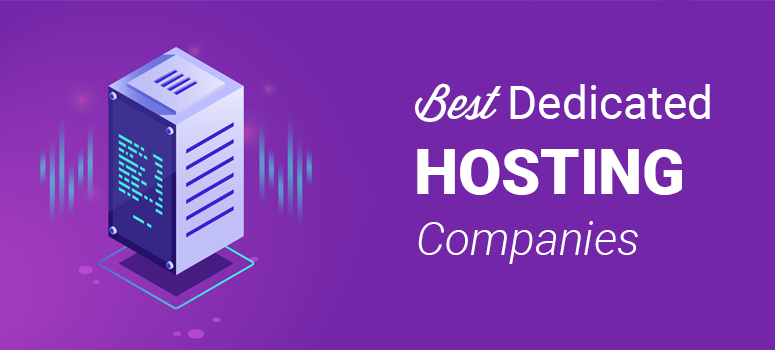
Are you looking for dedicated server hosting that gives you the resources to build a high-availability website?
A dedicated hosting service should give your website the foundation to withstand high traffic volume and provide 100% control over it.
We’ve tested dozens of dedicated hosting providers to determine if they live up to their promises. In our dedicated server hosting reviews, we’ll compare some of the best dedicated server hosting services available and also show you how to evaluate your needs to find the best dedicated hosting service for your website.
Before we take a look at the features and packages belonging to some of the best dedicated hosting services, it’s vital to understand what dedicated server hosting actually is and whether your website needs it or not.
We’ll also take a look at a few other hosting options available on the market and how they differ from dedicated server hosting.
What’s Dedicated Server Hosting?
Dedicated server hosting is a single hosting environment that’s dedicated specifically to a single customer’s website.
It’s the best choice if you want to lease an entire server for your sole use so you’d get full control over it and its configurations.
With dedicated server hosting, you can choose the equipment used, including the RAM, hard drive, and processor used by the server. As the entire server resources are allocated to your site, it costs more than any other hosting option.
You’ll also have to delegate a system administrator who knows the ins and outs of managing a dedicated server so that your website runs smoothly.
Are you wondering whether dedicated server hosting is right for you? Below are a few examples of when dedicated server hosting could be the best option for your site:
- Anticipating growth: Your website’s gaining rapid traction in your niche and you expect it to outgrow your existing hosting plan in the near future.
- Need more bandwidth: You need to host large files that may consume more bandwidth and resources.
- Operating resource-heavy apps: You want to process resource-heavy scripts and applications.
- High security: You need to host your site in a highly secure environment without sharing server resources with any other websites.
If you would like to quickly compare this list of the best dedicated hosting companies, here is a table you can go through.
| VPS Hosting | Cost | RAM | Disk Space | Bandwidth | Support |
|---|---|---|---|---|---|
| 1. HostGator | $89.98/mo. | 8 GB | 1 TB (HDD) | Unmetered | 10/10 |
| 2. Bluehost | $179.99/mo. | 8 GB | 1 TB (HDD) | Unmetered | 10/10 |
| 3. Hostinger | $8.99/mo. | 3 GB | 200 GB | Unlimited | 10/10 |
| 4. SiteGround | $100/mo. | 8 GB | 40 GB | 10 TB | 8/10 |
| 5. Dreamhost | $149/mo. | Up to 64 GB | 1 TB | Unlimited | 7/10 |
| 6. InMotion Hosting | $69.99/mo. | 16 GB | 1 TB | 6 TB | 9/10 |
| 7. Liquid Web | $75/mo. | 16 GB | 2x240 GB (SSD) | 8 TB | 10/10 |
Now that you have a basic understanding of dedicated server hosting, let’s take a quick look at some of the best providers available.
Top 6 Best Dedicated Hosting Companies (Compared)
 1. HostGator Dedicated Server
1. HostGator Dedicated Server
- RAM: 8 – 30 GB
- Disk space: 1 TB (HDD) – 1 TB (SSD)
- Bandwidth: Unmetered
- Website: HostGator.com
HostGator is one of the best dedicated hosting providers and lets you choose highly flexible hosting configurations. With HostGator’s dedicated hosting, you have the full system’s resources at your disposal.
With dedicated hosting, HostGator offers a minimum of 4 cores per server, 1TB of RAID storage, and between 8 and 30 GB of available RAM. They also provide you with data center-level DDoS protection and an IP-based firewall.
Pros
- Both HDD and SSD hard drive options are available, which enables you to choose the best storage device for your site.
- Their portal includes 500 video tutorials and nearly 700 articles related to dedicated hosting.
- Both managed and semi-managed dedicated hosting options are available.
- Runs on Intel Xeon-D CPU with unmetered bandwidth
- Supports Linux and Windows OS
Cons
- The starter plan doesn’t offer SSD storage.
- Money back guarantee is not available for dedicated hosting plans.
- Their top-tier plan only offers 1 TB SSD storage.
The pricing starts at $89.98 / mo.
Read our full HostGator review »
 2. Hostinger
2. Hostinger
- RAM: 3 – 20 GB
- Disk space: 200 – 300 GB
- Bandwidth: Unlimited
- Website: Hostinger.com
Hostinger offers cloud hosting that runs on dedicated servers. With all cloud hosting plans, you get a free domain and free website migration. This is the most affordable option in this list.
Their most popular Cloud Professional plan lets you host up to 300 websites. You get 250 GB NVMe storage and 6 GB RAM, along with 4 CPU cores.
Hostinger takes care of backups, email, SSL, and CDN without charge. All plans come with a dedicated IP address and a 30-day money back guarantee.
Pricing: Regular price starts at $11.99 per month for entry level plans
Special offer: Our users pay $8.99 per month (+3 months free)
 3. Bluehost Dedicated Server
3. Bluehost Dedicated Server
- RAM: 8 – 30 GB
- Disk space: 1 TB – 2 TB HDD
- Bandwidth: Unmetered
- Website: Bluehost.com
Bluehost is an officially recommended hosting provider by WordPress.org. The best thing about Bluehost is that they own their own data center and regularly invest in top-notch hardware and infrastructure.
Additionally, Bluehost has the ability to instantly provision their dedicated servers, so you can get started immediately.
Pros
- Unlike most dedicated hosting providers, your drives are completely mirrored, ensuring your data is well-protected.
- You’ll get 30-day money back guarantee, so you can try out their dedicated hosting service risk-free.
- cPanel included for free.
- Free SSL is included with every plan.
Cons
- Their hosting plans aren’t as flexible as other providers. You can’t customize your hosting plan when you sign up for their dedicated hosting service.
- Free migration services aren’t available.
The pricing starts at $179.99 / mo.
Read our full Bluehost review »
 4. SiteGround Dedicated Server
4. SiteGround Dedicated Server
- RAM: 8 – 20 GB
- Disk space: 40 – 160 GB
- Bandwidth: 10 TB
- Website: SiteGround.com
SiteGround is yet another popular dedicated hosting provider, which is independently run and has not been acquired by Endurance International Group, a leading web hosting company.
Their dedicated servers come under the cloud hosting plans. These are fully managed, which means SiteGround will keep its software up-to-date, monitor your machine 24/7, and react immediately in case of an issue.
Pros
- When you sign up for a dedicated hosting plan, you can choose your data center location.
- They offer fully managed servers, so you’ll always have peace of mind.
- Their amazing support team lets you reboot your servers upon request and provides a diagnosis in case of failure.
Cons
- SiteGround doesn’t offer a dedicated server but instead dedicated resources.
The pricing starts at $100.00 / mo.
Read our full SiteGround review »
 5. Dreamhost Dedicated Server
5. Dreamhost Dedicated Server
- RAM: Up to 64 GB
- Disk space: Up to 2 TB HDD
- Bandwidth: Unlimited
- Website: Dreamhost.com
DreamHost is an officially recommended hosting provider by WordPress.org. They offer fully managed dedicated hosting services for high-traffic websites.
DreamHost’s dedicated servers are big enough to handle your requirements. Within the DreamHost control panel, you can add or remove, reboot, or power-cycle your servers per your needs.
Pros
- Offers more core, RAM, and storage than their competitors.
- 24/7 tech support and server monitoring.
- Free SSL certificate beyond 1 year.
Cons
- The control panel has a bit of a learning curve
- Their support can be limited at times.
The pricing starts at $149 / mo.
Read our full Dreamhost review »
 6. InMotion Hosting Dedicated Server
6. InMotion Hosting Dedicated Server
- RAM: 16 – 512 GB
- Disk space: 1 TB – 2×3.2 TB
- Bandwidth: Unmetered
- Website: InMotionHosting.com
Get started with InMotion Hosting »
InMotion Hosting is one of the most popular dedicated hosting providers and comes with a lot of desirable hosting features for high-traffic websites.
When signing up for an InMotion Hosting plan, you can specify your custom server requirements such as specific software installations, clustered server setups, and more.
They also provide optional remote KVM access, which enables you to install and manage the operating system of your choice.
Pros
- They offer a maximum of 15 dedicated IPs.
- Every dedicated hosting plan comes with free launch assist, which provides you with free managed hosting service for 2 – 4 hours to get your server set up the way you want.
- Try their dedicated hosting service, risk-free for 30 days.
Cons
- They’re not early adopters of new technologies. For example, they were late in the game for Let’s Encrypt. Before that, they only supported free SSL via Comodo.
- Slow account setup because of their strict fraud prevention policies.
The pricing starts at $69.99 / mo.
Read our full InMotion Hosting review »
 7. Liquid Web Dedicated Server
7. Liquid Web Dedicated Server
- RAM: 16 GB
- Disk space: Up to 2×480 GB SSD
- Bandwidth: 8 TB
- Website: LiquidWeb.com
Liquid Web is a leading managed dedicated hosting provider. Their dedicated servers are completely customizable and can be run on various Linux distributions as well as the Windows OS.
With Liquid Web dedicated hosting, you get a minimum of 16 GB RAM, 8 TB bandwidth, 2 x 480 GB SSD primary storage, and 1 x 2 TB SATA backup drive.
Pros
- Choose between single-processor and dual-processor dedicated servers.
- All dedicated hosting plans come with 24/7 proactive sonar monitoring.
- Choose between fully managed, core managed, or self managed servers.
Cons
- Costlier than other dedicated hosting companies.
- Money back guarantee isn’t offered with a dedicated hosting plan.
The pricing starts at $75 / mo.
Read our full Liquid Web review »
Dedicated Server Hosting vs. VPS Hosting
Virtual Private Server (VPS) hosting is an in-between solution for resource-heavy sites that need to be hosted on a server that provides more flexibility and control than a shared hosting server. Compared to a dedicated server, VPS is cost-effective and is the best choice for those who can’t afford an entire physical server for their sole use.
VPS is basically an independent partition of a physical server. With virtualization, it creates multiple virtual partitions of a physical server in a way that you can effectively control your own resources and configure them the way you want.
VPS hosting could be the best choice in the following cases:
- More control without an entire server: Your website is growing rapidly, so you need more control over your server, but still can’t justify having your own server.
- Scalable hosting: You need a scalable hosting environment that allows you to increase the size based on your evolving needs.
- Multiple control panels: You need to set up multiple control panel accounts for multiple websites so you can easily manage the files and sites the way you want.
The good news is, web hosting companies also offer managed VPS hosting that doesn’t require you to possess the technical skills to administrate a server.
Dedicated Server Hosting vs. Shared Hosting
Most websites don’t require all the bells and whistles offered by dedicated server hosting. When you’re just starting out with a new website and expect low traffic volume, shared hosting is likely the best choice for your needs.
Shared hosting is the cheapest hosting option available on the market.
With shared hosting, your site will be hosted along with hundreds of other websites on the same physical server. That means you’ll also be sharing server resources with those websites. This is how hosting providers can profitably sell hosting plans to you for lower prices.
However, there’s nothing to be concerned about in regard to sharing server resources such as RAM because no other users can see or access your site’s files.
If you have minimal traffic and are looking for an affordable hosting solution that’s easy to maintain, you can start by choosing a shared hosting plan that you find suitable. Best of all, you can easily upgrade to better hosting options such, as VPS or a dedicated server, as your site grows.
Related: In detail Comparison of Dedicated vs Shared vs VPS Hosting.
Factors to Consider When Choosing Dedicated Server Hosting
The dedicated server hosting market is a competitive space. In order to stay ahead of the curve, hosting companies offer multiple perks to customers and promise great uptime always. Below are a few things you’ll need to consider when choosing a dedicated server hosting provider:
Uptime Guarantee
The uptime guarantee offered by your hosting provider is one of the most crucial factors you’ll need to consider when choosing a dedicated server hosting service. What does this mean and why is it important for your business?
Uptime is a term used to describe the period your website, hosted on a specific server, is available online. Usually, uptime is expressed as a percentage of the total available time which (365 days per year).
A few different factors can affect your server’s uptime, such as:
- Security threats
- Hardware failures
- Natural disasters
- Human error
- Backup disk corruption
- Power outages
For instance, a website that’s up all year long 24/7 is said to have 100% uptime. If uptime is 99%, that means your website will be down for 3.65 days.
While no host can honestly guarantee 100% uptime (though some hosts even promise it anyway), anything below 99.9% is considered unreliable.
Round the clock server monitoring
Worried whether your website will be up ’round the clock? To get maximum server uptime, it’s essential to have 24/7 proactive server monitoring to help you maintain optimal server functionality and health. That way, you can mitigate server-level issues without causing costly downtime.
Specifications
When you explore dedicated server hosting reviews, it’s essential to have a clear understanding of the features that should be non-negotiable in any solid dedicated server hosting plan.
RAM: Random Access Memory (RAM) acts like short-term memory and holds data gathered from the hard drive for easy access. When it needs to access other data, it just erases the previously-gathered data and acquires the new information.
Generally speaking, RAM varies from 4GB to 30GB for different server hosting plans.
Storage: Some hosting providers allow you to choose from HDD (Hard Disk Drive) and SSD (Solid State Drive) hard drive options.
In I/O Benchmarking tests, it’s been found that SSD provides twice as much as speed as HDD. SSD doesn’t have any moving parts and information is stored in microchips. On the other hand, HDD uses a mechanical arm with read/write head, which makes it slower than SSD.
SSDs are more expensive than hard drives in terms of dollar-per-gigabyte. The tricky part is, while hosting providers allow you to choose from SSD or HDD when purchasing a plan, the storage capacity you can choose from will be different.
For example, you can choose either 2 TB HDD or 512 GB SSD. That means when you choose SSD, you’ll be given an overall lower storage capacity.
To avoid confusion and offer the best performance, some hosting providers only offer SSD storage.
CPU: CPU is the brain of your hosting server. The main manufactures of CPUs are Intel and AMD. When it comes to servers, experts often recommend Intel because they’re well-known for blazing fast performance.
Pricing:
The price of your hosting server varies based on the hardware specifications of your dedicated server hosting. Pricing typically starts at $120 per month.
Keep the server specifications in mind when comparing the prices of different hosting options offered by different providers.
Technical Support
You never know when you’ll get into trouble with your server. As your visitors expect your site to be up around the clock, you’ll need to ensure that your hosting provider offers 24/7 support.
A few things to consider are:
- Support modes: Ensure your hosting provider offers free support via live chat, phone, and email throughout the day.
- Response time: Understand the typical time it takes to get a response and get your request resolved when you open a support ticket.
- Documentation: Having extensive documentation is an absolute must. With a great knowledge base, you won’t have to waste your time with live chats because, in most cases, you can get the issue sorted out on your own.
Recap: Best Dedicated Server Hosting Companies
After our dedicated server hosting review, we’ve found that Bluehost is the best dedicated hosting provider on the market. They offer different pricing plans that perfectly fit your needs regardless of the size of your business. Each server is custom built in-house by their engineers using only the latest technology for maximum performance.
Best of all, you’ll get a speedy response from experts whenever you need help. In fact, Bluehost’s dedicated team works closely with the same engineers who maintain your server, so they’re able to troubleshoot any issues at a moment’s notice.
If you’re looking for an affordable plan, then Hostinger is the best option.
If you’re looking for a host that offers robust performance, uptime, and a complete set of extraordinary features at a fair price, then Bluehost is for you!
FAQs: Choosing the Right Dedicated Hosting Service
Having helped hundreds of users choose the right dedicated hosting service for their needs, we’ve found that people ask the same sort of questions again and again. This is why we’ve compiled a list of frequently asked questions, so you can find the best dedicated server hosting service for your site.
How does dedicated hosting work?
With dedicated hosting, you’ll get an entire physical server for your site, which gives you full control over its software and hardware without having to share its resources with any other site. Since you’re the only one using an entire server, renting a dedicated server is costly and you’ll need a high level of technical knowledge to maintain it.
What type of technical skills do I need to manage dedicated server hosting?
With fully managed dedicated server hosting, you only need to know basic knowledge of file transfers and application management since you’ll be provided with an easy-to-use custom control panel.
With unmanaged dedicated server hosting, you’ll need to have deeper knowledge of administrating and managing a server for optimized performance.
How do I know whether my site needs dedicated server hosting?
If your site is rapidly gaining traction among your audience and you think you’ll soon outgrow your existing hosting options, like VPS hosting, it’s probably the right time to switch over to dedicated server hosting.
What should I expect from a dedicated hosting plan?
A good dedicated hosting plan costs around $120. Bear in mind that pricing depends on the server specifications including CPU type, amount of RAM, and the disk space your hosting company provides. While it’s often recommended to choose a server plan that comes with the latest hardware technology, some hosting providers offer a huge discount on legacy servers.
Below are a few features your dedicated server plan should offer:
- Should be located in a highly-secured, monitored data center.
- Should offer managed and unmanaged server hosting.
- Should offer a maximum uptime guarantee (99.9%).
- Should offer 24/7 free premium support.
What are the differences between unmanaged and managed dedicated server hosting?
With managed dedicated server hosting, your hosting company is responsible for keeping your server environment secure, configuring it, and doing routine maintenance. That way, you can eliminate the expenses of hiring a system administrator and focus more on market opportunities and growth. Though you’ll still have to do some technical tasks yourself, the list is typically much smaller than if you were running an unmanaged dedicated server.
With unmanaged dedicated server hosting, you’ll need to have the technical expertise to operate your own hosting server. You’ll also be responsible for server admin tasks, configuration, routine maintenance, and keeping the environment secure. Comparatively, it’s a cheaper option than managed dedicated hosting and it gives you more flexibility and control than a managed dedicated hosting.
How much does it cost to purchase a dedicated server hosting plan?
Dedicated server hosting plans typically start at $120 per month. The price varies based on the server configuration offered by your hosting provider. If you need cheaper dedicated hosting, you might opt for a legacy dedicated server hosting plan.
Is my dedicated server hosting scalable?
Absolutely! You can easily scale up the capacity of your dedicated server to meet your needs. If you’re anticipating growth in near future, you can switch over to larger or additional servers.
Why does hosting support matter?
When it comes to website hosting, you never know when you’re going to get in trouble.
In fact, just because a web hosting provider has a satisfactory uptime score, doesn’t necessarily mean your site will be 100% secure and up around the clock.
When you discover any issues with your hosting server, you’ll want to contact your hosting provider instantly and get the problems resolved as quickly as possible. This can only be done if your hosting provider has an excellent track record of resolving support requests with no hassle.
SSD vs HDD: What’s the difference?
SSD stands for Solid State Drive whereas HDD for Hard Disk Drive.
In I/O Benchmarking tests, it’s been found that SSD provides twice as much as speed as HDD. SSD doesn’t have any moving parts and information is stored in microchips. On the other hand, HDD uses a mechanical arm with a read/write head, which makes it slower than SSD.
What are dedicated servers for games?
A gaming server is a dedicated server used for multiplayer game apps. The primary benefit is that, when you have a dedicated server for hosting your games, the server will be more stable than the game client itself. If you want to provide a better gaming experience, choosing a dedicated server is recommended.
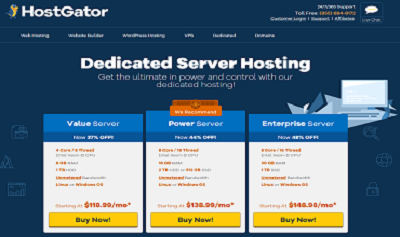
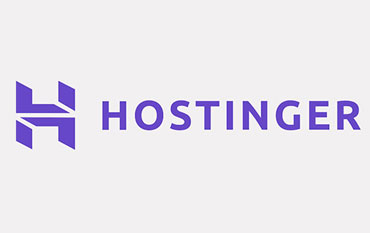
 3. Bluehost Dedicated Server
3. Bluehost Dedicated Server 4. SiteGround Dedicated Server
4. SiteGround Dedicated Server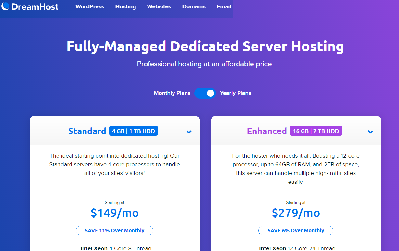 5. Dreamhost Dedicated Server
5. Dreamhost Dedicated Server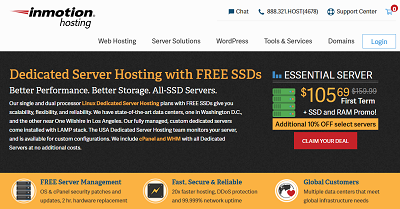 6. InMotion Hosting Dedicated Server
6. InMotion Hosting Dedicated Server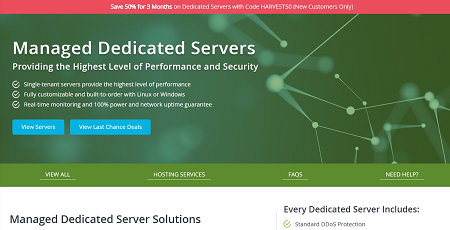 7. Liquid Web Dedicated Server
7. Liquid Web Dedicated Server